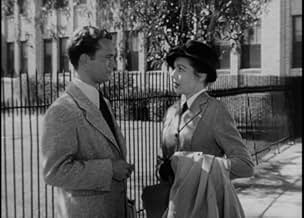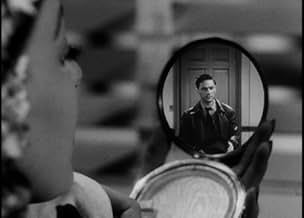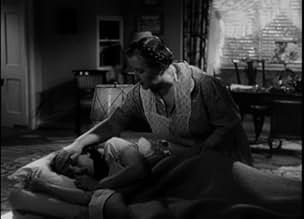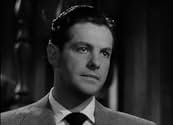IMDb RATING
6.8/10
1.2K
YOUR RATING
A beautiful psychology professor tries to hide a self-defense killing.A beautiful psychology professor tries to hide a self-defense killing.A beautiful psychology professor tries to hide a self-defense killing.
- Awards
- 1 win total
Billy Mauch
- Harry Brice
- (as Bill Mauch)
Eric Alden
- Detective
- (uncredited)
John Bishop
- Detective
- (uncredited)
Gladys Blake
- Boxing Fan
- (uncredited)
Barbara Brewster
- Miss Comar - Abe's Mother
- (uncredited)
Douglas Carter
- Detective
- (uncredited)
Featured reviews
It's hard deglamorize Loretta Young, and in fact, even the tailored outfits and the upswept hair don't do it in "The Accused" from 1949, also starring Robert Cummings and Wendell Corey. She's still considered quite a dish by anyone who meets her, including an amorous student (Douglas Dick).
Young plays a psychology professor who, about to be assaulted by a student, kills him and attempts to cover it up. At first it looks like a drowning, but later, it's discovered to be homicide. The young man's guardian (Cummings) arrives as the detective in charge of the case (Corey) zeroes in on Young.
Good movie with effective performances. Douglas Dick is appropriately smarmy.
My only objection would be, looking at it in light of today, the Young character made a bunch of mistakes with this guy that only a really foolish teacher would make today - or possibly back then. He is so obviously sexually aggressive, it's hard to believe she would have allowed herself to be alone with him.
Young and Cummings for me are always watchable, so I liked it.
Young plays a psychology professor who, about to be assaulted by a student, kills him and attempts to cover it up. At first it looks like a drowning, but later, it's discovered to be homicide. The young man's guardian (Cummings) arrives as the detective in charge of the case (Corey) zeroes in on Young.
Good movie with effective performances. Douglas Dick is appropriately smarmy.
My only objection would be, looking at it in light of today, the Young character made a bunch of mistakes with this guy that only a really foolish teacher would make today - or possibly back then. He is so obviously sexually aggressive, it's hard to believe she would have allowed herself to be alone with him.
Young and Cummings for me are always watchable, so I liked it.
A college professor (Young) commits murder while defending against an over-amorous student.
That noirish opening scene of a dark figure struggling along a deserted nighttime highway is iconic, especially when followed in flashback by deserted city streets and a lonely all-night bus. But once the flashbacks end, the movie settles into a fairly routine game of cat- and-mouse with strong psychological overtones. I'm also tempted to say the movie becomes a vehicle for Young, who gets to transform from dowdy career woman to fashionable beauty. However, the male roles (Cummings & Corey) are too large and well acted to allow that. Nonetheless, the film remains a Young showcase where the diva even gets to do the little fashion pirouette that distinguished her TV series.
Note a convention of the time: namely, that a woman can't have a career and be beautiful at the same time. Thus, Wilma (catch the plain-Jane name) as a professor is both grim and repressed. It's only after she essentially drops the career role that her appearance flowers. Young handles the demanding transition pretty well, without going over the top. Nonetheless, the number of close-ups leaves no doubt who the star is. My money, however, is on the rather exotic Wendell Corey (Det. Grogan). He's such an icy presence, it's hard to keep your eyes off him. Too bad that alcohol got the best of this unusual actor.
All in all, the pace may drag at times, but the movie still features enough points of interest to keep the momentum going.
That noirish opening scene of a dark figure struggling along a deserted nighttime highway is iconic, especially when followed in flashback by deserted city streets and a lonely all-night bus. But once the flashbacks end, the movie settles into a fairly routine game of cat- and-mouse with strong psychological overtones. I'm also tempted to say the movie becomes a vehicle for Young, who gets to transform from dowdy career woman to fashionable beauty. However, the male roles (Cummings & Corey) are too large and well acted to allow that. Nonetheless, the film remains a Young showcase where the diva even gets to do the little fashion pirouette that distinguished her TV series.
Note a convention of the time: namely, that a woman can't have a career and be beautiful at the same time. Thus, Wilma (catch the plain-Jane name) as a professor is both grim and repressed. It's only after she essentially drops the career role that her appearance flowers. Young handles the demanding transition pretty well, without going over the top. Nonetheless, the number of close-ups leaves no doubt who the star is. My money, however, is on the rather exotic Wendell Corey (Det. Grogan). He's such an icy presence, it's hard to keep your eyes off him. Too bad that alcohol got the best of this unusual actor.
All in all, the pace may drag at times, but the movie still features enough points of interest to keep the momentum going.
In The Accused, Loretta Young plays a psychology professor who kills an amorous male student in self-defense, then spends the rest of the movie covering up her crime. William Dieterle does an excellent job with the familiar material, and Miss Young gives a sympathetic performance. This is one of several crime pictures that Hal Walls produced in the late forties and early fifties, many of which fall into the noir category. Most of these films concern people with conflicted or tortured sexual urges, dysfunctional families, inadequate or just barely adequate men, with the women often hysterical or scheming. At the time this must have seemed daringly modern and contemporary. Now it just seems quaint, a waystation in the breakdown of small-town American values, with the action taking place in a netherworld between Andy Hardy and Tennessee Williams.
The movie is surprisingly sympathetic toward Miss Young, who, though on the cusp of middle age, still looks pretty damn beautiful. Robert Cummings is stronger than usual as her "suitor", while Wendell Corey is his inscrutably poker-faced self, as always, hinting between the lines, that had his character been better written he'd be more than up to the task. If this was so, I believe him. In a smaller role, Sam Jaffe is positively mephistopholean, delivering his lines as tartly as Corey, and in his lab scenes photographed to resemble a Dwight Frye hunchback from the thirties. A nice touch. The Accused is filled with nice touches, as Dieterle and most of his cast are much better than the script, breathing real life into it at times, which makes watching the movie a pleasure. There are no real surprises here, but lots of good scenes.
The movie is surprisingly sympathetic toward Miss Young, who, though on the cusp of middle age, still looks pretty damn beautiful. Robert Cummings is stronger than usual as her "suitor", while Wendell Corey is his inscrutably poker-faced self, as always, hinting between the lines, that had his character been better written he'd be more than up to the task. If this was so, I believe him. In a smaller role, Sam Jaffe is positively mephistopholean, delivering his lines as tartly as Corey, and in his lab scenes photographed to resemble a Dwight Frye hunchback from the thirties. A nice touch. The Accused is filled with nice touches, as Dieterle and most of his cast are much better than the script, breathing real life into it at times, which makes watching the movie a pleasure. There are no real surprises here, but lots of good scenes.
The twist on what we now call sexual harassment lingers as the most interesting aspect of The Accused, an innocuous suspense story with some effective moments. Another lingering aftertaste is the midcentury stereotype of the female academic that's foisted on star Loretta Young -- and the viewer.
Psychology professor Young (!), guarded and old-maidish (she's even saddled with the glamourproof name Wilma Tuttle), becomes the object of the unhealthy attentions of one of her students (Douglas Dick). On the pretext of diving for abalone shells off Malibu, he spirits her off to a secluded lover's lane one night and forces himself on her. She bashes in his skull and fakes his death to look accidental.
Then she begins to attract more attention -- from Robert Cummings, a lawyer friend of the dead boy's family (he falls for her), and Wendell Corey, a dogged homicide cop. In the acting department, there's no contest; Cummings stays his usual namby-pamby self, while Corey delivers a strong, unsentimental performance, among his best.
Much of William Dieterle's direction shows a practiced hand. Especially well handled are the opening sequence of Young fleeing the crime scene, a boxing match where she suffers a flashback, and the ghoulish reconstructions of the murder by forensic pathologist Sam Jaffe.
But a glaring structural flaw keeps The Accused lukewarm. We know from the outset that Young acted in self-defense, which pretty well leeches all the suspense out of Corey's implacable pursuit; the tightening case against her packs no impact because it's safe to assume she won't be spending any time with those harpies from Caged. Consequently the film focuses more on her emergence from a cocoon of droopy skirts, a bun in her hair, sleeping pills and swooning spells into a seductive butterfly flitting into Cummings' net.
Dick, as the young narcissist, calls to mind such amoral charmers as Robert Walker in Strangers On A Train and John Dall in Rope (a film in which Dick also appeared). It's he -- not young nor Cummings -- who supplies what faint erotic spark this movie, about a sexually-based murder, dares to kindle.
Psychology professor Young (!), guarded and old-maidish (she's even saddled with the glamourproof name Wilma Tuttle), becomes the object of the unhealthy attentions of one of her students (Douglas Dick). On the pretext of diving for abalone shells off Malibu, he spirits her off to a secluded lover's lane one night and forces himself on her. She bashes in his skull and fakes his death to look accidental.
Then she begins to attract more attention -- from Robert Cummings, a lawyer friend of the dead boy's family (he falls for her), and Wendell Corey, a dogged homicide cop. In the acting department, there's no contest; Cummings stays his usual namby-pamby self, while Corey delivers a strong, unsentimental performance, among his best.
Much of William Dieterle's direction shows a practiced hand. Especially well handled are the opening sequence of Young fleeing the crime scene, a boxing match where she suffers a flashback, and the ghoulish reconstructions of the murder by forensic pathologist Sam Jaffe.
But a glaring structural flaw keeps The Accused lukewarm. We know from the outset that Young acted in self-defense, which pretty well leeches all the suspense out of Corey's implacable pursuit; the tightening case against her packs no impact because it's safe to assume she won't be spending any time with those harpies from Caged. Consequently the film focuses more on her emergence from a cocoon of droopy skirts, a bun in her hair, sleeping pills and swooning spells into a seductive butterfly flitting into Cummings' net.
Dick, as the young narcissist, calls to mind such amoral charmers as Robert Walker in Strangers On A Train and John Dall in Rope (a film in which Dick also appeared). It's he -- not young nor Cummings -- who supplies what faint erotic spark this movie, about a sexually-based murder, dares to kindle.
Here is as "quiet" a suspense film as you are likely to encounter. That is all to the good, as beneath its placid surface crackle psychological crosscurrents that generate tension throughout. Each of the main characters is an interesting study, with ambivalent emotions that alternately spark and grate against those of the others. Additionally (and ironically), these characters are all involved in recognizing and dealing with such behavior, being a psychology professor, a detective and a lawyer respectively. A bit verbose at times, and resolved with a glib, less-than-satisfying ending, this picture nevertheless deserves a wider audience - if it has any at all nowadays. The performances are rock-solid and properly understated for the most part (even by Robert Cummings) in keeping with the conservative small town atmosphere; but there are effective contrasting performances as well, in the smaller roles of the few relatively unbalanced characters, as played by Douglas Dick, Suzanne Dalbert, and especially Sam Jaffee.
Did you know
- TriviaOne of over 700 Paramount productions, filmed between 1929 and 1949, which were sold to MCA/Universal in 1958 for television distribution, and have been owned and controlled by Universal ever since. Its earliest documented telecast took place in Seattle Friday 24 October 1958 on KIRO (Channel 7); it first aired in Phoenix Friday 13 March 1959 on KVAR (Channel 12), and it soon became a popular local film favorite as it was first aired in Denver 9 April 1959 on KBTV (Channel 9), by both Chicago and Milwaukee 25 April 1959 on WBBM (Channel 2) and WITI (Channel 6), by Boston 10 May 1959 on WBZ (Channel 4), by Asheville 17 May 1959 on WLOS (Channel 13), by Grand Rapids 5 September 1959 on WOOD (Channel 8), by Detroit 22 September 1959 on WJBK (Channel 2), by Philadelphia 26 September 1959 on WCAU (Channel 10), by Los Angeles 3 October 1959 on KNXT (Channel 2), by Johnstown 30 October 1959 on WJAC (Channel 6), by Minneapolis 4 November 1959 on WTCN (Channel 11), by Toledo 20 November 1959 on WTOL (Channel 11), by Omaha 21 November 1959 on KETV (Channel 7), and by Pittsburgh 16 January 1960 on KDKA (Channel 2). It was released on DVD 28 September 2016 as part of the Universal Vault Series.
- GoofsWarren Ford invites Dr. Tuttle for breakfast, even though it is twelve noon, when lunch would be more appropriate.
- Quotes
[Wilma is dressed for a date.]
Warren Ford: It's remarkable! Your brains don't show a bit.
- ConnectionsFeatured in Frances Farmer Presents: The Accused (1960)
- How long is The Accused?Powered by Alexa
Details
- Runtime
- 1h 41m(101 min)
- Color
- Aspect ratio
- 1.37 : 1
Contribute to this page
Suggest an edit or add missing content






















